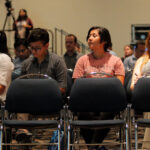James Paul Gee, in “Literacy, Discourse, and Linguistics,” defines Discourse as “a way of being in the world.” Gee goes into detail in his journal, but for everything it’s worth, Discourse is most simply described as the way one is expected to act amongst a certain group of people. Said group could be one’s loving family (considered one’s primary discourse), or a random cluster of investors (one of many secondary discourses).
An individual, in order to be successful in life, must adjust themselves to any possible Discourse they may occupy. If they don’t “belong” – if they’re not yet familiar with the customs of a given group – then they’re simply not in the Discourse. Of course, Gee’s description is not that one-minded; while cynical to an extent, he simply argues that fluency – or literacy – in how a Discourse acts and speaks is required to really be in there. Understanding is emphasized over full assimilation. As long as you’re literate in what you’re supposed to be a part of, there shouldn’t be an issue. Thankfully, there’s no shortage of literacies for one to get acquainted with.
Gail E. Hawisher and Cynthia L. Selfe once expressed the importance of gaining technological literacy. “Becoming Literate in the Information Age” was published in between the explosion of personal computers through the 1990s and the launch of the iPhone. Even if it depicts an antiquated Web, it made the point that fluency in computers was already becoming necessary to function in society.
The entire percentage of computer users is a large secondary discourse to hop into, but in the years since, it’s been one that many have been quick to adapt to. In the midst of language morphing to fit the needs of Internet users, it’s fitting that the bedrock of technological literacy has influenced those who aren’t even interacting on a screen. That said, especially with hindsight, all three authors involved do make the act of socializing sound more daunting than it tends to be.
Still, the point stands: literacy is the sum of your experience fraternizing with others. If you’re literate with technology, you have a good idea of what’s expected of you out in the world – even if your Twitter timeline happens to be your main secondary discourse, somehow.





Leave a Reply